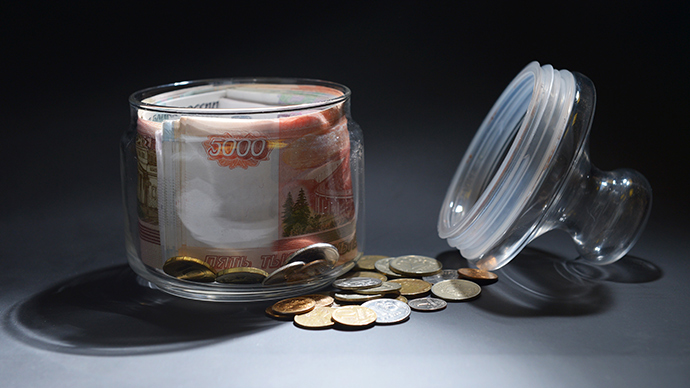Ruble crisis

The Russian national currency is suffering its worst turmoil since the 1998 default, as a combination of dropping oil prices, trader fears, and reduced access to international financing has sent it into free fall.
25 December 2014
08:35 GMTThe Russian currency continues to rise at the opening of the Moscow Exchange, standing at 52.7 rubles against the US dollar and 64.5 to the euro at 11am MSK. The Central Bank of Russia announced Thursday it hadn’t sold any currency on December 23.
24 December 2014
12:06 GMTThree of the major PC suppliers in Russia - Acer, Asus and Lenovo - have denied rumors supplies to the country will be suspended. The companies told Lenta.ru they are adjusting prices to the new ruble rate and the models and quantity available.
- 11:35 GMT
The ruble started to lose ground against the US dollar and the euro in the middle of the trading session in Moscow Wednesday, as the international rating agency S&P revised its outlook for Russian debt and said it could be dropped to junk status in January.
- 08:04 GMT
Asus, Russia’s second biggest player in the PC market, has stopped supplies to the country amid sharp fluctuations in the ruble’s exchange rate, says Taipei Times. The company is expected to resume deliveries after the currency stabilizes. Other foreign electronics producers like Apple, Samsung, Sony and HTC have responded to a ruble crisis by increasing their prices.
- 07:51 GMT
The Russian ruble is continuing its strengthening against hard currencies Wednesday trading at 54.55 against the US dollar and 66.59 to the euro. At 10:50 MSK both dollar and euro had lost more than 1 percent of their value since the last closing of the Moscow Stock Exchange.
23 December 2014
16:58 GMTThe Russian Ruble closed at 54.6 against the US Dollar and 66.5 against the euro Tuesday, showing a continued recovery during the trading session. This was the third consecutive strengthening session for the ruble as the Central Bank of Russia used its big financial tools.
READ MORE: Ruble at 2-wk high as Central Bank pulls out big financial tools
- 13:11 GMT
Yota Devices the maker of the Russia-made YotaPhone 2 has increased its prices by 20 percent in Russia due to the 35 percent change in the ruble exchange rate since the end of November. The decision was made because the company uses foreign component suppliers, and payment is in foreign currency, said CEO Vladislav Martynov quoted by TASS.
Not just evil American Apple that's raising prices. Russia's own YotaPhone 2 will be 20% more expensive soon. #rublecollapse
— Natalia Antonova (@NataliaAntonova) December 23, 2014
- 12:16 GMT
Russia’s five huge oil exporters including Gazprom and Rosneft have been ordered to sell part of their foreign exchange revenues in the next couple of months, Kommersant reports Tuesday. This is expected to add an estimated $1 billion daily to the market, which should serve as strong support for the ruble.
- 08:05 GMT
The Russian ruble has continued strengthening in the first hour of trading at the Moscow Exchange Tuesday. The currency stood at 54 against the US Dollar and 66 against the euro at 11:00 MSK. Meanwhile, the oil has also grown, with Brent trading at $60.23/bbl.
The link between #oil prices and the #ruble has been broken for now... pic.twitter.com/A1tGj8oO0N
— jeroen blokland (@jsblokland) December 23, 2014 22 December 2014
16:38 GMTThe US dollar fell 3.55 rubles below last week’s close finishing Monday trading in Moscow at 56 rubles. For the first time since December 11 the greenback has fallen below 55 rubles during the day. Experts believe the ruble’s strengthening is caused by an increased demand for rubles due to tax payments and big Russian exporters selling foreign currency.












